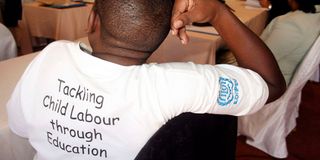Employers face new restrictions on engaging children

The Children's Act operationalised on July 26, 2022, aims to protect children's rights and provide for their care and protection.
What you need to know:
- Lawyer says unscrupulous employers engage children below 18 years old in employment.
- Children's Act aims to protect children's rights and provide for their care and protection.
Employers may soon face restrictions on engaging children below the age of 18 in any employment activity if a petition by a city lawyer is successful.
Mr Clifford Odhiambo, a Nairobi-based advocate under Clifford Odhiambo and Company Advocates, has filed a petition challenging sections of the law that permit child labour.
The suit targets sections of two acts, the Employment Act, and the newly operationalised Children's Act, which Mr Odhiambo argues have provided a loophole for the exploitation of children and the violation of their rights through labor practices.
Mr Odhiambo contends that the Employment Act and the Children's Act allow unscrupulous employers to engage children below 18 years old in employment, exposing them to hazardous and exploitative labor and denying them their right to education, as guaranteed in the constitution.
The petition is grounded in the Employment Act (Cap 226) and the Children Act (Cap 141) of the Laws of Kenya, which, according to the advocate, provide for the employment of children.
The Employment Act operationalised on June 2, 2008, aims to define the fundamental rights of employees, provide basic conditions of employment, and regulate the employment of children.
Freedoms of children
However, he argues that certain sections, such as Sections 56 and 57, legalize the employment of persons under the age of 18, violating the constitutional rights and freedoms of children.
Section 56 prohibits employing a child under 13 years old, yet fails to define what constitutes light work for children aged 13 to 16, leading to ambiguity and potential exploitation.
“The section by making it illegal to employ children between 13-16 years makes it legal to employ children between ages of 5-12 and 17 years. This category of persons are defined as children under article 260 of the constitution. They are also a vulnerable group according to the constitution and enjoy the same constitutional protection and privileges appurtenant to children as stated herein,” stated the lawyer.
Section 57 permits the employment of children aged 13 to 16 but lacks provisions for written contracts, leaving room for abuse by employers.
“It is difficult to enforce a verbal contract as the terms of service are never known. This means an employer can change the terms of payment, working hours, working place, disciplinary rules, etc,” read ‘the lawyer’s application.
Similarly, the Children's Act operationalised on July 26, 2022, aims to protect children's rights and provide for their care and protection.
Exploitative labour
However, Mr Odhiambo argues that the Act does not adequately address protection from hazardous or exploitative labour, as required by the constitution.
“To date the parliament has not enacted any legislation to give effect to article 52 (1)(d) of the constitution. Protection of children from hazardous or exploitative labour is only mentioned in passing under Section 18 of the Children Act,” he states.
Mr Odhiambo has sued various entities, including the Speaker of the National Assembly, the Kenya Law Reform Commission, and the Attorney General, seeking a declaration that certain sections of the Employment Act and the Children's Act violate children's fundamental rights.
He wants the court to issue a declaration that Sections 55, 56, 57, 58, 59, 60,62, 62, 63, 64, and 65 which form part of VII of the Employment Act together with part IV of the Employment Act violate/threaten the fundamental rights and freedoms of children as guaranteed in the Bill of rights.
He also seeks to challenge section 18 of the Children's Act and the International Labour Organisation (ILO) C138 minimum age convention 1973.
Justice Mugambi directed that the petition be served within 14 days, with responses due within a similar timeframe. The matter will be mentioned on May 6 for further directions.





